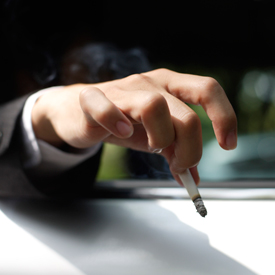Doctors call for smoking ban in cars
Ministers should ban all smoking in cars to protect children from harmful levels of second-hand smoke, says the British Medical Association.

Evidence suggests that smoking in a closed vehicle exposes occupants to a higher level of harmful chemicals, according to a briefing paper by the doctors’ union, the British Medical Association (BMA). Toxin levels can be 23 times higher than in a smoky bar.
Children are particularly at risk, as they absorb more pollutants than adults and their immune system is less able to cope with second-hand smoke, said the BMA. The elderly are more likely to develop respiratory problems, and these can also be made worse by inhaling cigarette smoke.
Governments in Wales and Northern Ireland are already considering the ban.
‘Bold and courageous’
Dr Vivienne Nathanson, the BMA’s director of professional activities, said that smoking causes 80,000 deaths each year in England and six million worldwide, and called on the government to take this “bold and courageous” step.
Legislation is a gross over-reaction. What next, a ban on smoking in the home? Simon Clark, Forest director
“The current UK government prefers voluntary measures or ‘nudging’ to bring about public health change, but this stance has been shown to fail time and time again,” said Dr Nathanson.
Prime Minister David Cameron, an ex-smoker, said he fully supported the current smoking ban in public places, but said he was “nervous about going into what people do inside a vehicle”.
Ban is ‘over-reaction’
The smokers’ pro-choice lobby group, Forest, said there was no justification for a smoking ban in cars.
“We don’t condone smoking in cars with children,” said Forest Director Simon Clark. “It’s inconsiderate, certainly, but only a small minority of people do so these days. Adults have a choice and they can choose not to travel in a vehicle if the driver is smoking.
“Legislation is a gross over-reaction. What next, a ban on smoking in the home?”
The BMA’s proposal is part of a briefing paper launched to coincide with the second reading of a private member’s bill, calling for a ban in vehicles with child passengers. It is due to be debated on 25 November.